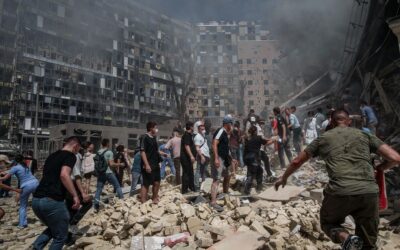At the European Mariapolis the story of a possible friendship that sows seeds of peace Open up and “choose an inclusive lifestyle”. Open up to reconcile with each other and discover the pearl that is inside each person. Open up like Jesus, who met everyone, and let the Holy Spirit act “who rejoices in diversity but pursues unity”. This is the way pursued by Rev Ken Newell, Presbyterian minister in Belfast, capital of Northern Ireland. A land that still suffers today from the wounds left by the conflict that for 30 years, since the end of the 1960s, has seen unionists and separatists opposing each other: the first, Protestants, who support belonging to the United Kingdom; the second, Catholics, who support the reunification of Northern and Southern Ireland. A political conflict that has poisoned the social fabric, turning cities into battlefields and leading to “religious segregation”: Protestants and Catholics live in different neighbourhoods, communities do not meet, there is mistrust and prejudice. It was not easy for Reverend Ken to try to build bridges. He had to begin with himself. “ I grew up in Belfast in a Protestant and Unionist community” – he tells the European Mariapolis – “ in my early years I was shaped by the culture of my community (..); many things were healthy, good and serene; other aspects influenced me with negative attitudes towards the Catholic, Irish and Nationalist community, which took me years to overcome”. A path that helped him gradually to open up and discover the beauty of diversity. While in Holland the meeting with a priest convinced him to attend a Mass. Or again in Indonesia, where, as a teacher in a seminary in Timor, he was able to immerse himself in a different country, with its own language, food and culture. “I began to realize that, just as there are different colours in the rainbow, so too God created the human race with incredible diversity; valuing the cultures of Timor taught me to value the good within my own culture. In contact with the priest Noel Carrel, the discovery of a possible friendship: “we realized that we were in Timor to serve the one Christ, that we had the same Heavenly Father and we were brothers. I asked myself if it would be possible to have such a friend in Northern Ireland. Hence a clear awareness: “The Holy Spirit made me open up to “diversity” at the other end of the world and prompted me to seek the best in Irish Catholic culture and spirituality. Returning to Belfast in 1976, he was called to lead the Presbyterian Church of Fitzroy: his inclusive lifestyle was against the tide. In one of the toughest moments of the conflict, his invitation to build new relationships was taken up by the members of a Redemptorist monastery in Clonard: and so, began the Association of Clonard – Fitzroy. The human and spiritual friendship with Father Gerry Reynolds, leader of the Community of Clonard, “companion in the building of peace”, gave rise to many experiences of sharing: “We begin to go together to the funerals of policemen killed by terrorists and of innocent civilians killed by loyalist paramilitary groups; it is rare to see Protestant ministers and Catholic priests together at funerals to comfort the families of the deceased”. It then happens that they participate in each other’s celebrations and that Fr. Gerry and Rev. Ken participate together in marriages between people from different Churches. Another unthought of step is made possible: the priest and the minister are invited to meetings with political leaders of the opposing parties, to reach a ceasefire and adopt policies of peace. Slowly, politicians from the main parties in Northern Ireland, the pro-British DUP and the pro-Irish Sinn Fein, recognise the Clonard – Fitzroy Association as a “safe space” for discussion. The desire for reconciliation grows that will lead, in 2007, to the “miracle of Belfast”: “in Stormont, the government building of Northern Ireland” – says Rev. Newell – “Rev. Ian Paisley, Prime Minister of the shared executive power, and the Deputy Prime Minister, Martin McGuinness, former commander of the IRA, descend the marble staircase, sit side by side in front of the world press and address the people of Northern Ireland; they speak of their determination to lead the country towards a better and more reconciled future”. It is the dawn of a new day. The Clonard-Fitzroy Association, which has been operating for 38 years and has inspired thousands of similar initiatives, received the 1999 Pax Christi International Peace Prize.
Claudia di Lorenzi




0 Comments